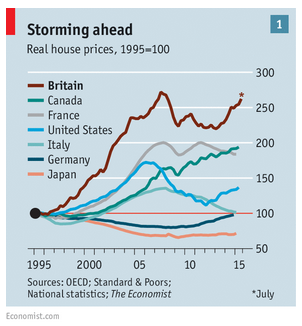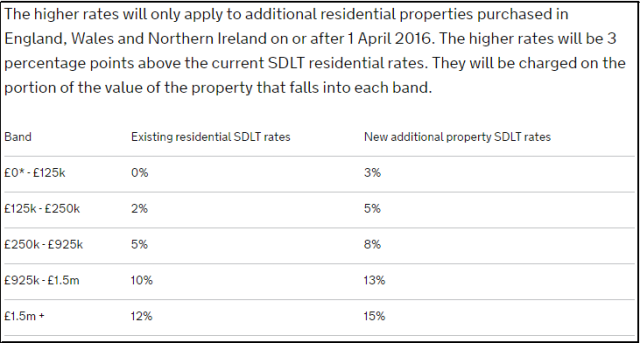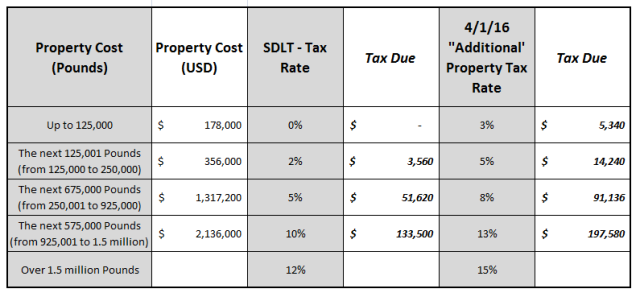How about one more piece on housing? I think you’ll find this one interesting. Let’s take a look at England.
Back in September of last year, The Economist magazine posted an article entitled ‘Through the Roof‘. Here’s a quote from the article: “As house prices rise globally, in Britain they are soaring. In the past 20 years they have increased by more than in any other country in the G7 (see chart 1); by some measures British property is now the most expensive in the world, save in Monaco.” Wow. Staggering.
And here’s Chart 1:
Clearly, as you can see above, 2008 to 2010 were tough years for everone. Home values in Japan and Germany – in the macro – haven’t lifted in over 20 years. But for the first 1/2 of 2015 they were WAAAAAYYY up in Britain. Way up.
An interesting fact: As of October 2013, of half of the 507,000 sites with planning permission, half had yet to see any building. Per the article, for 40 years the construction of new houses has been “a remarkably stable one-tenth the number of houses bought and sold.” Odd…approved sites, ready to build, sitting idle.
The Independent, a UK newspaper, offered this critical explanation:
“Britain’s largest developers have been accused of profiteering on the back of the country’s housing crisis by restricting the supply of new houses to keep prices unnecessarily high.
Latest figures reveal that a record half a million homes in England now have planning permission granted but have yet to be built. The length of time it takes for developers to complete a house has jumped from 24 to 32 weeks.
Ministers are increasingly concerned by the failure of developers to speed up housebuilding and there are fears that some are deliberately restricting supply of new houses to boost profits.”
Hmmm…I doubt that’s the explanation…but it’s possible. But, regardless of cause, home values seemed headed toward the heavens. up…UP….UP ! ! !
Until recently. Prices are falling. Yes, falling. Why? What changed?
Taxes. The UK government modified an existing tax law at the end of 2014…which took effect in January of 2015. This law, called the Stamp Duty Land Tax now imposes an upwardly sliding tax scale on the buyer of property. Not the seller. When implemented a bit more than a year ago, if you were to buy a house (actually, non-residential property is included too) in England, Wales and Northern Ireland over 125,000 pounds in cost (about $178,000) you – the buyer – will pay a ‘stamp duty land tax’ that increases in size as the property value increases.
And if that wasn’t enough, toward the end of 2015, Chancellor George Osborne announced further revisions to the Act: Effective 2 days from today – on April 1, 2016 – buyers of ‘second homes’ and any ‘additional’ property (investment properties) will pay a 3% surcharge ABOVE the standard SDLT rates. Take a look at this chart, extracted from the http://www.gov.uk website:
Remember this is a tax the buyer pays. At the time of purchase. If this sounds bad in theory, let’s calculate some actual tax bills. Let’s make it real. Here’s a chart I’ve created to calculate tax due at the different sale price levels:
OK, perhaps it’s hard to get too weepy for the buyer of a $2,136,000 ‘second home flat’ in central London, but, hey, that’s almost $200,000 in tax – in addition to the price! Almost 10% of the purchase price! And for every $100,000 in price – over $2,136,000 – the buyer will pay $15,000 in tax. Ouch.
What’s the objective of this tax? According the government:
“Owning a home is an aspiration for millions of people in our country. This government is committed to helping people achieve that aspiration, by supporting those who want to work hard, save and buy their own home.
This Plan re-focuses support for housing towards low-cost home ownership for first-time buyers. The tax receipts will help towards doubling the affordable housing budget. This will help first time buyers and is part of the government’s commitment to supporting home ownership.”
A noble purpose, no doubt. Bernie Sanders would be proud. On a more serious note, I think we’d all agree they had to do something. Try something.
But what if this noble gesture backfires? What if prices begin to plummet? Could this action create a demand/supply imbalance that might threaten the entire market?
According to research by LSL Property Services, home prices in central London began dropping sharply by the end of 2015. LSL’s house price index for December 2015, for London’s five most expensive central boroughs and City of London, saw house prices fall by 8.7% on average over the year.
Hmmm…quite an experiment, if you ask me. A dangerous one. Sure, affordable housing is needed. Home ownership is a good thing. But this is dangerous. Not only are apartment and ‘flat’ rents sure to rise and the number of buyers/owners will fall, thereby harming all the renters in the marketplace, but this massive new tax could have very serious, adverse consequences. Time will tell.
Let’s hope this bad idea stays overseas in England. It’s one ‘import’ we don’t need here in the US.
- Terry Liebman




Pingback: London is Falling! | terryliebman